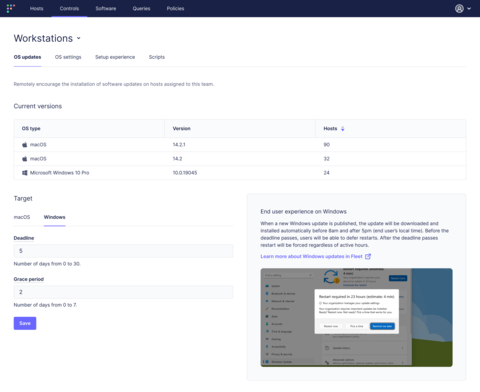Fleet Lets IT Departments Replace Broadcom's Workspace ONE With Open-Source Device Management
Enterprises conduct their final MDM migrations with Fleet to manage all Linux, Windows, and Apple devices from a single platform

Fleet centralized dashboard for Mac and Windows OS updates (Graphic: Business Wire)
Currently used by companies including Snowflake, Fastly, Uber, Segment, Atlassian, and Gusto, and governments, Fleet allows IT teams to enroll their Windows and Linux devices in the same modern Mac-first platform they use to manage Apple. It lowers barriers to integration and helps teams ramp up to modern, vendor-agnostic device management faster by providing a single platform that can be used by all admins and engineers, regardless of their training or past experiences.
"We wanted this to be our last MDM migration,” said the IT manager at a large gaming company. "Rather than letting a bunch of tools dictate how we staff and run things, Fleet is like a lower level of abstraction. It gives admins a more open, consistent approach to device management. We can define how we manage devices all in one place, whether we're talking about declarative device management (DDM) and FileVault on macOS, Autopilot and configuration service providers (CSPs) on Windows, or remote lock/wipe for Linux.”
Fleet provides an open API for every endpoint, accelerating the pace of "zero trust" and other endpoint initiatives for IT admins. By providing features top security teams already love, and using a consistent interface across every operating system, enterprises remove their reliance on brittle processes and hacks that slow new projects and make it harder to troubleshoot issues and respond to incidents.
“Many companies and organizations today are using multiple MDM platforms in addition to their own internally developed efforts based on Mac, Windows and Linux device mix and a variety of other factors,” said Ken Buckler, Research Director at Enterprise Management Associates. “The resulting complexity and the need for platform-specific training and staffing can make it harder to adhere to specific workflows and hinder productivity, while also significantly increasing costs. Platforms like Fleet that provide unified support for all major operating systems with a modern user experience address these issues and provide strong value in the market today.”
Unlike other device management platforms, Fleet enables IT departments to:
- Manage every kind of device from a single, open-source platform
- Pass audits and offboard employees without making engineers give up their Linux computers
- Implement "zero trust" faster with practical features built directly into the MDM
- Use a simple GUI or manage devices as code with a DevOps/GitOps/configuration-as-code workflow
- Collect system data automatically without having to maintain vendor-specific abstractions like Jamf extension attributes (EAs) and custom fields
- De-risk MDM configuration changes and reduce engineering time with unified approvals and versioning
“Anyone with multiple CMDBs or operating systems will benefit from using Fleet,” said Fleet CEO Mike McNeil. “And look, even if you've never done an MDM migration, you've probably heard it ain't easy. But it should be. We’ve worked extremely hard to make it easy for our customers to get their data in and to get it out. We're not trying to lock you into a certain way of doing things. We couldn't, even if we tried. It's open source.”
For more information:
- About the product: https://fleetdm.com/device-management
- Product documentation: https://fleetdm.com/docs
- About the company: https://fleetdm.com/handbook/company
About Fleet
Fleet is an open-source platform for IT and endpoint security teams with lots of computers. The company is dedicated to making IT more accessible with an open API for every endpoint, while maintaining privacy, transparency, and trust through open-source software. Organizations like Fastly and Gusto use Fleet for device management, device health ("zero trust"), posture assessment, endpoint operations, and more. Backed by Sid Sijbrandij (NYSE: GTLB, GitLab), Dylan Field (Figma), CRV, and other smart people, Fleet is an all-remote company with 47+ team members on four continents. For more information, visit fleetdm.com, or read the open-source company handbook.
View source version on businesswire.com: https://www.businesswire.com/news/home/20240124945742/en/
Wilson Craig
Mindshare PR
wilson@mindsharepr.com
1 408-516-6182
Source: Fleet







